
Press Freedom Under Threat at the Pentagon
In a move that has raised eyebrows across the media landscape, Defense Secretary Pete Hegseth's recent restrictions on press access at the Pentagon have unearthed concerns not only about operational transparency but also about the erosion of press freedom. Announced just before a holiday weekend, this directive restricts journalists from accessing key areas, including the offices of top military leaders, without prior clearance and an escort. This shift marks a stark contrast to previous administrations where the media maintained a more open relationship with the military.
Historical Context and Background on Pentagon Media Relations
Historically, the Pentagon has been a place where journalists could access information crucial for public understanding of military operations. Past secretaries have worked to foster a collaborative relationship with the press, understanding the importance of a free media in a democratic society. However, with leaks causing embarrassment for the current administration—most notably the revelation of Elon Musk's briefing on military plans—there seems to be a pivot towards tightening control. An analysis of past governmental interactions with the press sheds light on this changing dynamic.
Public Reaction: Press Association Voices Concerns
The Pentagon Press Association has voiced their skepticism regarding Hegseth's assertion that these measures are necessary for national security. According to their statement, this shift appears to be an outright attack on the freedoms the press has historically enjoyed, raising questions about accountability and transparency in military operations. By restricting journalists’ movements to non-secured hallways, the press association worries that the public may not be adequately informed about military actions and potential missteps.
The Implications of These Restrictions
This tightening of media access at the Pentagon could have far-reaching implications not only for national security but also for public discourse. With a government more inclined to conceal rather than reveal, it raises a crucial question: what will be lost in the name of security? Information is power, and withholding it may lead to a less informed citizenry—a troubling prospect in a democracy.
Future Insights: How This Might Affect Coverage
As these restrictions take hold, many wonder how they will shape the coverage coming out of Washington. Will journalists adapt and find new avenues to share information, or will this hardline approach stifle the press’s role as watchdog? It’s possible that increased restrictions will lead to an increase in investigative reporting on the part of the press, with journalists becoming more determined to uncover the truth despite governmental barriers. However, it could also lead to a chilling effect, where media professionals hesitated to pursue stories for fear of retribution or limited access.
Emotional Insight: The Impact on Journalists and Public Trust
At the heart of this battle lies a deeply emotional issue: trust. Many journalists passionately believe in their role in society and the ethics that guide their work. The press is not merely a channel for information; it serves as a conduit for public consciousness and accountability. When the press faces restrictions, it symbolizes a deeper struggle over the right to know, fostering a sense of vulnerability among those who dedicate their lives to delivering accurate news. This situation begs the question: what kind of America do we want, and how will journalism fit into that vision?
Actionable Insights: What Can You Do?
In light of these unfolding events, it's crucial for citizens to remain engaged. Advocacy for press freedoms and understanding the implications of such governmental changes is vital. Participating in discussions about media freedoms, supporting independent journalism, or simply staying informed can foster a more vibrant democratic process. Media literacy has never been more crucial, and understanding the implications of government transparency versus secrecy can empower citizens to hold authorities accountable.
Let Your Voice Be Heard
The current landscape is one that requires vigilance and advocacy. As entertainment enthusiasts and engaged citizens, it is essential to ensure our voices are heard, promoting a balance between national security and press freedom. We must continue to advocate for the transparency that allows us to understand the bigger picture of our military operations and national policies.
It's time to take a stand—whether by engaging in local discussions, writing to representatives, or supporting outlets that strive for transparency. Your participation enhances the ongoing dialogue about the crucial role a free press plays in our democracy.
 Add Row
Add Row  Add
Add 






Write A Comment